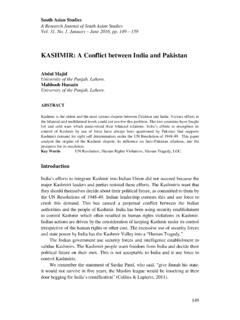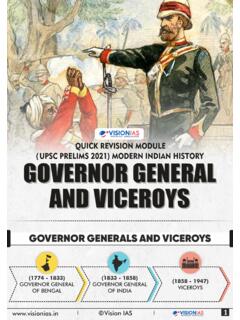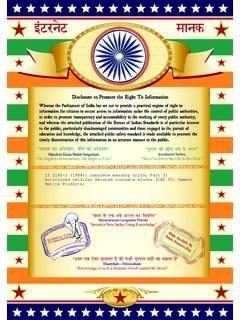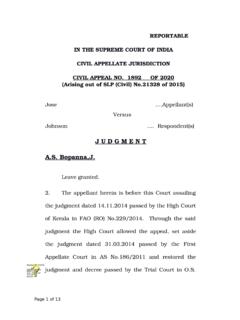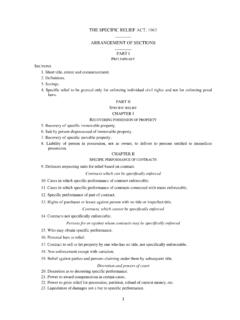Transcription of IN THE SUPREME COURT OF INDIA CIVIL APPELLATE …
1 1. REPORTABLE. IN THE SUPREME COURT OF INDIA . CIVIL APPELLATE JURISDICTION. CIVIL APPEAL NO. 116 OF 2019. (@SLP(C) No(s). 26932/2018). SNEH LATA GOEL Appellant(s). VERSUS. PUSHPLATA & ORS. RESPONDENT(s). JUDGMENT. DR DHANANJAYA Y CHANDRACHUD, J. 1 Leave granted. 2 This appeal arises from a judgment and order of the High COURT of Jharkhand at Ranchi dated 15/17 July 2018. 3. Signature Not Verified The facts lie in a narrow compass: Digitally signed by MANISH SETHI. Date: 11:59:36 IST. Reason: On 9 May 1985, a partition suit 1 was instituted by Smt. Saroja Rani, daughter of Late 1 154/1985. 2. Rai Sri Krishna (since deceased), in respect of her 1/4 th share in the suit property which comprises of properties at Ranchi and Varanasi. The suit was instituted at Ranchi in the COURT of the Special Subordinate Judge. The defendant in that suit (since deceased). filed a petition before the High COURT of Judicature at Patna questioning the jurisdiction of the Ranchi Courts.
2 The petition was disposed of by the High COURT on 10 May 1989. with the direction that any objection to jurisdiction would be decided by the Special Subordinate Judge at Ranchi as a preliminary issue. A preliminary decree was passed ex-parte on 13 June, 1990 granting the Petitioner her extent of 1/4 th share in the schedule property. A final decree was passed on 5 April 1991 confirming the preliminary decree passed on 13 June, 1990. One of the defendants in the partition suit filed a title suit 2 before the COURT of Subordinate Judge, Ranchi. On 22 July 2003, the suit was dismissed for non- prosecution. The first respondent filed a title suit 3 before the COURT of Subordinate Judge at Varanasi which was dismissed under Order VII, Rule 11 of the CPC on 12 April 2005. on the ground of being barred under Section 21A of the Code of CIVIL Procedure 1908. ( CPC ). The first respondent filed an application under Order IX Rule 13 in respect of the title suit filed at Ranchi which was also dismissed as withdrawn on 19 February 2008.
3 Since the mother of the appellant was alive when the suit was instituted, the claim was confined to a 1/4th share. During the pendency of the suit, the mother died. As a result, there was a modification in the share of the three sisters at 1/3 rd each. On 18 December 2013, the Subordinate Judge at Ranchi passed a supplementary final decree in view of 2 114/1998. 3 176/2000. 3. the death of the mother of the appellant and the first respondent on 9 February 1996. 4 On 12 May 2014, the appellant filed proceedings for the execution of the final decree at On 1 January 2015, the first respondent filed an objection under Section 47 of the Code of CIVIL Procedure contending that the decree dated 13. June 1990, the final decree dated 5 April 1991 and the supplementary final decree dated 18 December 2013, were without jurisdiction and therefore, a nullity. On 10 March 2015, the first respondent challenged the decree dated 13 June, 1990 in appeal under Section 96 of the The appeal is pending.
4 5 On 10 March 2016, the executing COURT dismissed the objections of the first respondent under Section 47 of the CPC with the following observations: The decree holder is entitled to get the fruits of the decree and the executing COURT cannot go behind the decree. When a decree is made by a COURT which has no inherent jurisdiction, an objection as to its validity may be raised in an execution proceeding if the objection appears on the face of the record. Where the objection as to the jurisdiction of the COURT to pass the decree does not appear on the face of the record and requires examination of the questions raised and decided at trial, which could have been but have not been raised, the executing COURT will have no jurisdiction to entertain an objection as to the validity of the decree on the ground of jurisdiction.. Aggrieved by the order of the executing COURT , the first respondent initiated proceedings under Article 227 of the Constitution of INDIA .
5 The High COURT by its impugned judgment and order came to the conclusion that the executing COURT was in error in holding that it lacked jurisdiction to entertain the objection as to the validity of the decree on ground of an alleged absence of territorial jurisdiction. 4 5/2014. 5 43/2015. 4. 6 The High COURT observed that the plea that the decree could not be executed on the ground that it had been passed by a COURT which had no territorial jurisdiction to entertain the partition suit could have been raised under Section 47 of the CPC. The High COURT held thus: The executing COURT fell in serious error in law where it has observed that the executing COURT will have no jurisdiction to entertain an objection as to the validity of the decree on the ground of jurisdiction. Under Section 47 CPC, the petitioner has not challenged the validity of the decree on merits, rather the plea taken by her is that the decree cannot be executed for it has been passed by a COURT which had no territorial jurisdiction to entertain Partition Suit of 1985.
6 The application raising the objection was hence restored to the file of the executing COURT for disposal. 7 Assailing the judgment of the High COURT , these proceedings have been instituted. Mr Mukul Rohatgi, learned senior counsel appearing on behalf of the appellant submitted that an objection to territorial jurisdiction does not relate to the inherent jurisdiction of the CIVIL COURT . Such an objection has to be addressed before that COURT and in the event that the COURT rejects such an objection, it must be raised before the competent COURT in appeal. Consequently, the High COURT was in error in directing the executing COURT to deal with such an objection. Moreover, it was urged that the respondent was aware of the proceedings which were taking place, which is evident from the following circumstances: (i) The respondent had filed a title suit before the COURT at Ranchi which was dismissed for non-prosecution on 22 July 2003.
7 (ii) The respondent filed a title suit before the COURT at Varanasi which was dismissed 5. under Order VII, Rule 11 of the CPC on 12 April 2005; and (iii) The respondent filed an application under Order IX Rule 13 in respect of the title suit filed at Ranchi which was also dismissed as withdrawn on 19 February 2008. Based on these circumstances, it was urged that the objection which has been allowed to be raised in execution is merely an effort to delay and obstruct the implementation of the decree which has been passed in the suit for partition. 8 On the other hand, Mr. S. R. Singh, learned senior counsel appearing on behalf of the respondents, has urged the following submissions: (i) An objection to the lack of territorial jurisdiction is an objection to the subject matter of the suit and hence of a nature that can be raised before the executing COURT . In support, reliance is placed on the decisions of this COURT in Kiran Singh v Chaman Paswan6 and Harshad Chiman Lal Modi v DLF Universal.
8 (ii) The impugned order of the High COURT is an interlocutory order and hence it is not appropriate at this stage to entertain a proceeding under Article 136 of the Constitution of INDIA ; and (iii) The case of the respondents all along has been that the property on the basis of which jurisdiction was founded at Ranchi did not belong to the common ancestor and in which event, the CIVIL COURT at Ranchi had no jurisdiction to entertain the suit for partition. 9 In assessing the merits of the rival submissions, it would, at the outset, be necessary to advert to the provisions of Section 21 of the CPC. Section 21(1) postulates that no objection as to the place of suing shall be allowed by any APPELLATE or revisional COURT 6 AIR 1954 SC 340. 7 (2005) 7 SCC 791. 6. unless the objection was taken in the COURT of first instance at the earliest possible opportunity and in all cases where issues are settled on or before such settlement, and unless there has been a consequent failure of justice.
9 (2) No objection as to the competence of a COURT with reference to the pecuniary limits of its jurisdiction shall be allowed by any APPELLATE or Revisional COURT unless such objection was taken in the COURT of first instance at the earliest possible opportunity, and in all cases where issues are settled, at or before such settlement, and unless there has been a consequent failure of justice. (3) No objection as to the competence of the executing COURT with reference to the local limits of its jurisdiction shall be allowed by any APPELLATE or Revisional COURT unless such objection was taken in the executing COURT at the earliest possible opportunity, and unless there has been a consequent failure of justice.. Sub-section (1) of Section 21 provides that before raising an objection to territorial jurisdiction before an APPELLATE or revisional COURT , two conditions precedent must be fulfiled: i) The objection must be taken in the COURT of first instance at the earliest possible opportunity; and ii) There has been a consequent failure of justice.
10 This provision which the legislature has designedly adopted would make it abundantly clear that an objection to the want of territorial jurisdiction does not travel to the root of or to the inherent lack of jurisdiction of a CIVIL COURT to entertain the suit. Hence, it has to be raised before the COURT of first instance at the earliest opportunity, and in all cases where issues are settled, on or before such settlement. Moreover, it is only where there is a consequent failure of justice that an objection as to the place of suing can be entertained. Both these conditions have to be satisfied. 10 The learned counsel appearing on behalf of the respondents has submitted that 7. the objection as to the lack of territorial jurisdiction was raised in the written statement before the trial COURT . But evidently the suit was decreed ex-parte after the respondents failed to participate in the proceedings.
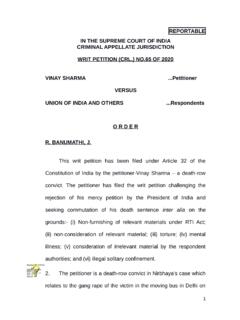
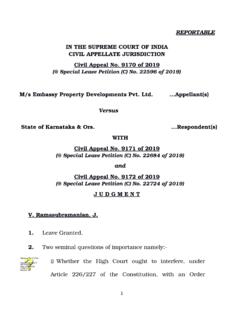
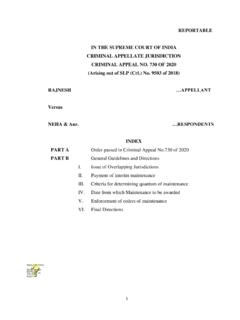
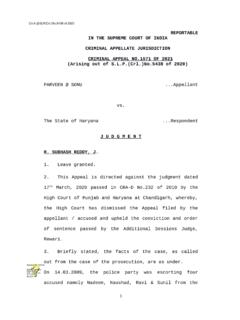
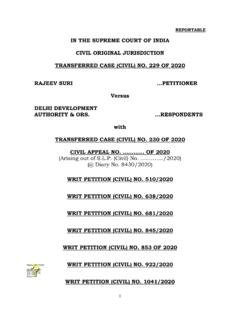
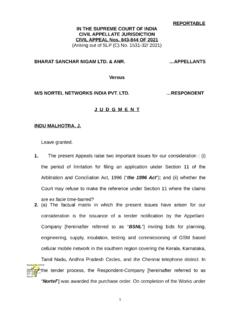
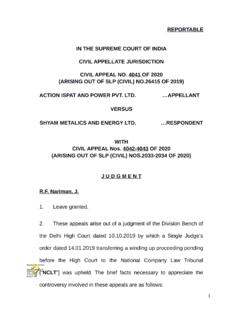
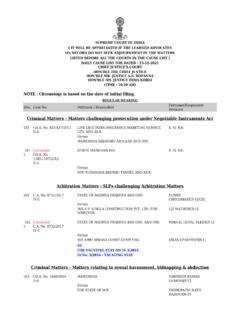
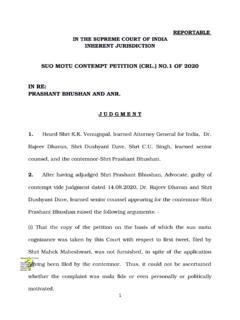
![[DEFAULT / OTHER MATTERS] [SERVICE/COMPLIANCE] …](/cache/preview/4/8/a/c/d/7/0/e/thumb-48acd70e206083f8f3d37421a64ec859.jpg)
